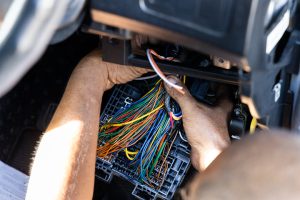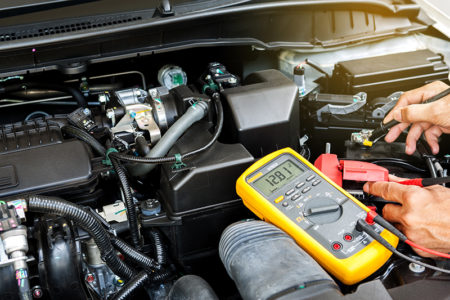Understanding the Basics of Auto Electrics: A Comprehensive Guide
In the intricate world of automobiles, the role of auto electrics is pivotal. Modern vehicles heavily rely on a complex electrical system that powers various components, from ignition to entertainment systems. This guide aims to delve into the fundamentals of auto electrics, providing a comprehensive overview for both beginners and enthusiasts.
The Heart of the System: Battery and Alternator
The foundation of an automobile’s electrical system lies in the battery and alternator. The battery serves as a reservoir of electrical energy, supplying power to start the engine and supporting various accessories when the vehicle is not running. Meanwhile, the alternator recharges the battery and generates electricity to power the vehicle’s electrical components during operation.

Understanding the health and maintenance of these components is crucial for ensuring a reliable electrical system. Regularly checking the battery for corrosion, ensuring proper connections, and monitoring the alternator’s output are essential steps to prevent unexpected breakdowns.
Wiring and Circuits: Nervous System of Your Vehicle
Much like the nervous system in living organisms, a vehicle’s electrical wiring and circuits form a network that facilitates communication and power distribution. Wiring connects various components, and circuits control the flow of electricity to specific systems. Over time, wear and tear, corrosion, or faulty connections can disrupt this network, leading to electrical malfunctions.
Performing routine inspections of the wiring, identifying and repairing damaged sections, and ensuring proper grounding are key practices to maintain a healthy electrical system. Additionally, understanding the vehicle’s wiring diagram can aid in troubleshooting and resolving electrical issues effectively.
Ignition System: Sparking the Power
The ignition system is responsible for starting the engine by creating a spark in the combustion chamber. Key components of the ignition system include the spark plugs, ignition coil, distributor (or ignition module), and the starter. Each plays a vital role in the ignition process.
Regularly checking and replacing spark plugs, inspecting the ignition coil for signs of wear, and ensuring a functional starter motor are essential for a smooth engine start. Ignition timing, controlled by the distributor or ignition module, must also be within manufacturer specifications for optimal performance.
Lights and Accessories: Enhancing Safety and Comfort
Auto electrics extend beyond the essential components under the hood. Lights, sensors, entertainment systems, and other accessories contribute to the overall driving experience. Understanding how these components operate and ensuring their proper function is crucial for both safety and comfort.
Routine checks on headlights, brake lights, and turn signals, as well as maintaining electrical connections for accessories like air conditioning and audio systems, are integral to a trouble-free driving experience. Any malfunctioning component should be promptly addressed to prevent potential safety hazards.
Advanced Auto Electrics: Sensors and Computer Systems

In contemporary vehicles, advanced sensors and computer systems play a significant role in monitoring and controlling various functions. Engine control modules (ECMs), anti-lock braking systems (ABS), airbag systems, and other electronic components contribute to enhanced performance, safety, and fuel efficiency.
Regular software updates, diagnostic checks using OBD-II (On-Board Diagnostics) scanners, and addressing sensor malfunctions are essential for maintaining the optimal functionality of these advanced systems. Keeping abreast of technological advancements is crucial for both drivers and technicians.
Conclusion: Navigating the Auto Electrics Landscape
In conclusion, the basics of auto electrics encompass a broad spectrum of components and systems that collectively contribute to a vehicle’s functionality. Regular maintenance, understanding wiring diagrams, and staying informed about technological advancements are key to ensuring a reliable and efficient auto electrical system.
By grasping the fundamental principles outlined in this guide, both novices and seasoned enthusiasts can navigate the intricate landscape of auto electrics with confidence. A well-maintained electrical system not only enhances the overall driving experience but also contributes to the longevity and reliability of the vehicle.

